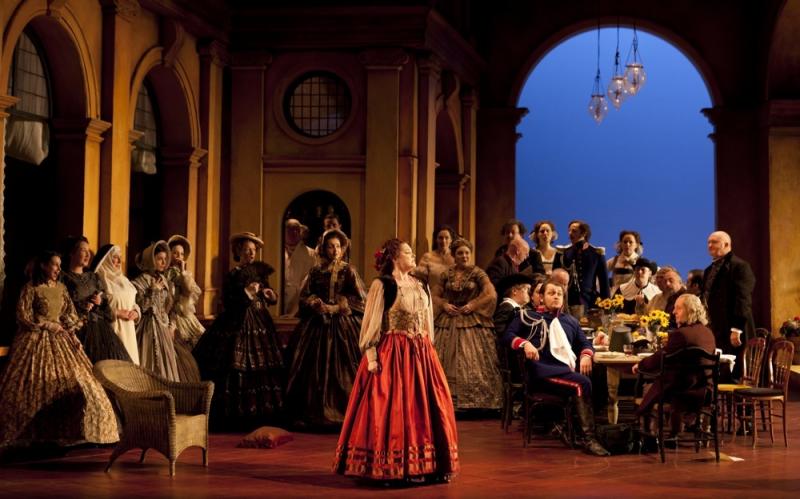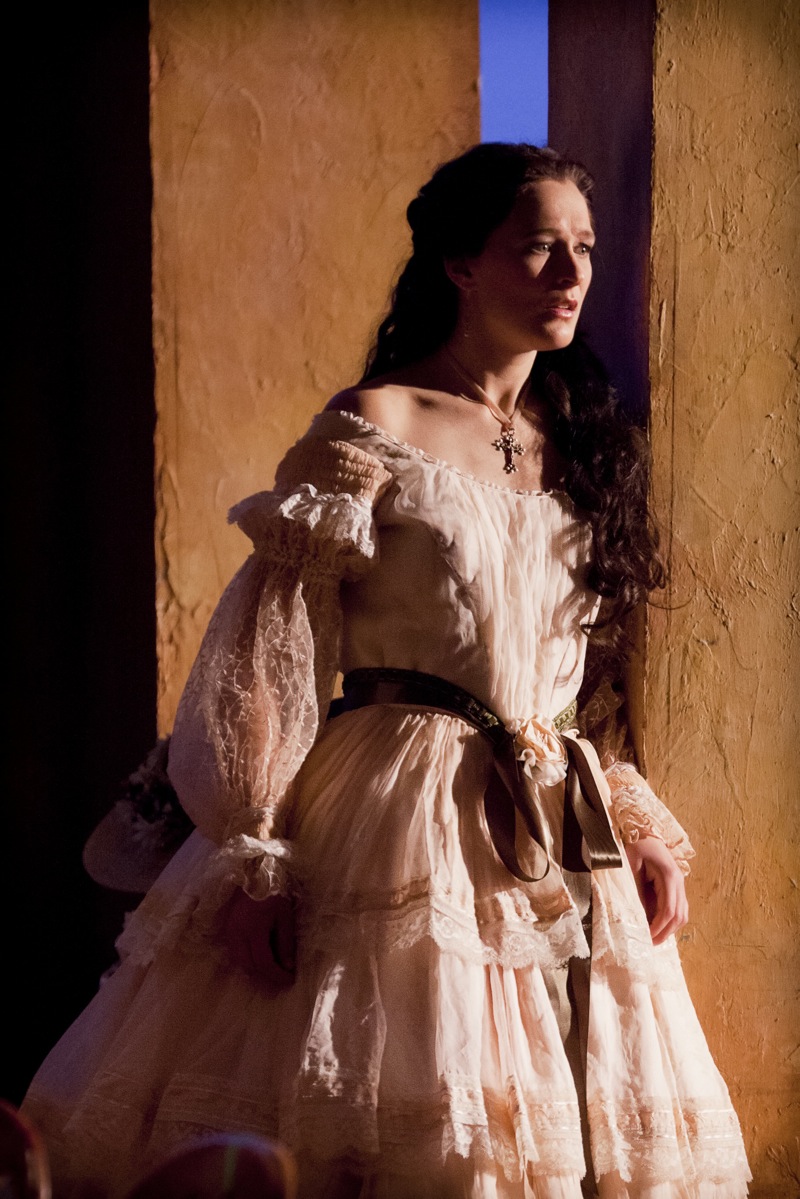Beatrice and Benedict, Welsh National Opera | reviews, news & interviews
Beatrice and Benedict, Welsh National Opera
Beatrice and Benedict, Welsh National Opera
Berlioz's last opera glows but stutters in an uneven Cardiff revival

Such a pity about Beatrice and Benedict! As a musical visualiser, a creator of musical tableaux, a radio composer avant la lettre, Berlioz had few equals. The Damnation of Faust is surely the greatest radio opera ever written. But for some reason he had no grasp of the stage. Benvenuto Cellini is a lifeless succession of spectacular tableaux.
As for Berlioz’s singing-telegram version of Much Ado About Nothing, it would have merited that title all too well if Berlioz had risked it. As it is, the one he chose tells us precisely what the work is not about, which I suppose is a triumph of sorts. The real heroine is, aptly enough, Hero. She has the biggest solo and the major part in the two big female ensembles. Yet her lover, Claudio (almost her sole topic of conversation) sings nothing except a small part in one trio, and is otherwise passive or absent.
Berlioz called the work a caprice written with the point of a needle, but it needs playing of equivalent refinement
The nominal hero and heroine discover and discuss their love in spoken dialogue, and have nothing approaching a love duet. Beatrice hardly sings in Act 1, Benedict hardly in Act 2. And so on. Almost every dramatic (as opposed to musical) decision is a mistake. Somehow WNO’s revival of their now quite antiquated Elijah Moshinsky production gets round this with a lovely, exquisitely lit Renaissance-arcade set by Michael Yeargan (lighting by Howard Harrison), some witty stage business, especially for the musician Somarone (brilliantly farced up by Donald Maxwell), and well-posed tableaux vivants, which accept the beauty of Berlioz’s inspiration while acknowledging his dramaturgic frailty.
WNO do make some mistakes of their own, it’s true. I can see why they play Beatrice in Geoffrey Dunn’s skilful English, not least for the jokes; but the invitation to regret the absence of Shakespeare’s sparkling barrage of repartee in the presence of odd fragments of it is altogether too glaring. Much better, surely, go French and hang the comprehension (Maxwell, at least, would be funny in any language).
 But the main risks are musical ones, and not all of them come off. Somarone’s send-up of a bad village choir, wonderfully exaggerated, and perhaps too well corrected second time through, is a little near the bone when the pit orchestra also has its rough patches of wind intonation and the stage choir, usually peerless with this company, has moments of untypical coarseness. Berlioz called this last opera of his “a caprice written with the point of a needle”, but it needs playing of equivalent refinement. Here, under Michael Hofstetter, the needle-point is blunted by careless balance, with high woodwind and brass stepping too enthusiastically into the spotlight. On the other hand, Hofstetter’s pacing of music so quicksilver subtle in its movement and texture is mostly excellent: not his fault that every five minutes or so the music has to stop at the traffic lights of stodgy, semi-Shakespearean dialogue.
But the main risks are musical ones, and not all of them come off. Somarone’s send-up of a bad village choir, wonderfully exaggerated, and perhaps too well corrected second time through, is a little near the bone when the pit orchestra also has its rough patches of wind intonation and the stage choir, usually peerless with this company, has moments of untypical coarseness. Berlioz called this last opera of his “a caprice written with the point of a needle”, but it needs playing of equivalent refinement. Here, under Michael Hofstetter, the needle-point is blunted by careless balance, with high woodwind and brass stepping too enthusiastically into the spotlight. On the other hand, Hofstetter’s pacing of music so quicksilver subtle in its movement and texture is mostly excellent: not his fault that every five minutes or so the music has to stop at the traffic lights of stodgy, semi-Shakespearean dialogue.
The cast looks strong on paper, sometimes struggles with Berlioz’s gaucheries in practice. Laura Mitchell (pictured above) has moments of real splendour in Hero’s extraordinary Act 1 aria with its huge written-out cadenza (what did Berlioz think he was writing?), and the poised beauty of her “Nuit paisible et sereine!” duet with the dark-toned Ursula of Anna Burford ends the act on a high musical note, though at times, in this big arena, the voice forces a touch and perhaps lacks the last measure of warmth.
Sara Fulgoni’s Beatrice – repeated, as she may not care to be reminded, from the original production of 1994 – is commanding when Berlioz allows, which is essentially only once, in her lovely second act aria, a Gluckian scena that has precious little to do with the character but is incomparable as a set piece.
Robin Tritschler’s lank-haired Benedict – allegedly but inaudibly becolded on the first night – has a lovely delicacy of tone and mobility, but lacks snap to go with a character who, until his too easy conversion to sentimental lover, is all crackle. No one else gets much chance to sing anything worthwhile, but they all have a go at talking what amounts to badly remembered Shakespeare. Not surprisingly, the success rate varies.
- Beatrice and Benedict at the Wales Millennium Centre on 26 Feb then touring
Share this article
The future of Arts Journalism
You can stop theartsdesk.com closing!
We urgently need financing to survive. Our fundraising drive has thus far raised £49,000 but we need to reach £100,000 or we will be forced to close. Please contribute here: https://gofund.me/c3f6033d
And if you can forward this information to anyone who might assist, we’d be grateful.

Subscribe to theartsdesk.com
Thank you for continuing to read our work on theartsdesk.com. For unlimited access to every article in its entirety, including our archive of more than 15,000 pieces, we're asking for £5 per month or £40 per year. We feel it's a very good deal, and hope you do too.
To take a subscription now simply click here.
And if you're looking for that extra gift for a friend or family member, why not treat them to a theartsdesk.com gift subscription?
more Opera
 The Makropulos Case, Royal Opera - pointless feminist complications
Katie Mitchell sucks the strangeness from Janáček’s clash of legalese and eternal life
The Makropulos Case, Royal Opera - pointless feminist complications
Katie Mitchell sucks the strangeness from Janáček’s clash of legalese and eternal life
 First Person: Kerem Hasan on the transformative experience of conducting Jake Heggie's 'Dead Man Walking'
English National Opera's production of a 21st century milestone has been a tough journey
First Person: Kerem Hasan on the transformative experience of conducting Jake Heggie's 'Dead Man Walking'
English National Opera's production of a 21st century milestone has been a tough journey
 Madama Butterfly, Irish National Opera review - visual and vocal wings, earthbound soul
Celine Byrne sings gorgeously but doesn’t round out a great operatic character study
Madama Butterfly, Irish National Opera review - visual and vocal wings, earthbound soul
Celine Byrne sings gorgeously but doesn’t round out a great operatic character study
 theartsdesk at Wexford Festival Opera 2025 - two strong productions, mostly fine casting, and a star is born
Four operas and an outstanding lunchtime recital in two days
theartsdesk at Wexford Festival Opera 2025 - two strong productions, mostly fine casting, and a star is born
Four operas and an outstanding lunchtime recital in two days
 The Railway Children, Glyndebourne review - right train, wrong station
Talent-loaded Mark-Anthony Turnage opera excursion heads down a mistaken track
The Railway Children, Glyndebourne review - right train, wrong station
Talent-loaded Mark-Anthony Turnage opera excursion heads down a mistaken track
 La bohème, Opera North review - still young at 32
Love and separation, ecstasy and heartbreak, in masterfully updated Puccini
La bohème, Opera North review - still young at 32
Love and separation, ecstasy and heartbreak, in masterfully updated Puccini
 Albert Herring, English National Opera review - a great comedy with depths fully realised
Britten’s delight was never made for the Coliseum, but it works on its first outing there
Albert Herring, English National Opera review - a great comedy with depths fully realised
Britten’s delight was never made for the Coliseum, but it works on its first outing there
 Carmen, English National Opera review - not quite dangerous
Hopes for Niamh O’Sullivan only partly fulfilled, though much good singing throughout
Carmen, English National Opera review - not quite dangerous
Hopes for Niamh O’Sullivan only partly fulfilled, though much good singing throughout
 Giustino, Linbury Theatre review - a stylish account of a slight opera
Gods, mortals and monsters do battle in Handel's charming drama
Giustino, Linbury Theatre review - a stylish account of a slight opera
Gods, mortals and monsters do battle in Handel's charming drama
 Susanna, Opera North review - hybrid staging of a Handel oratorio
Dance and signing complement outstanding singing in a story of virtue rewarded
Susanna, Opera North review - hybrid staging of a Handel oratorio
Dance and signing complement outstanding singing in a story of virtue rewarded
 Ariodante, Opéra Garnier, Paris review - a blast of Baroque beauty
A near-perfect night at the opera
Ariodante, Opéra Garnier, Paris review - a blast of Baroque beauty
A near-perfect night at the opera
 Cinderella/La Cenerentola, English National Opera review - the truth behind the tinsel
Appealing performances cut through hyperactive stagecraft
Cinderella/La Cenerentola, English National Opera review - the truth behind the tinsel
Appealing performances cut through hyperactive stagecraft

Add comment